Unit 12 What did you do last weekend Period 2 Section A (Grammar Focus-3c)课件(共34张PPT)
文档属性
| 名称 | Unit 12 What did you do last weekend Period 2 Section A (Grammar Focus-3c)课件(共34张PPT) | 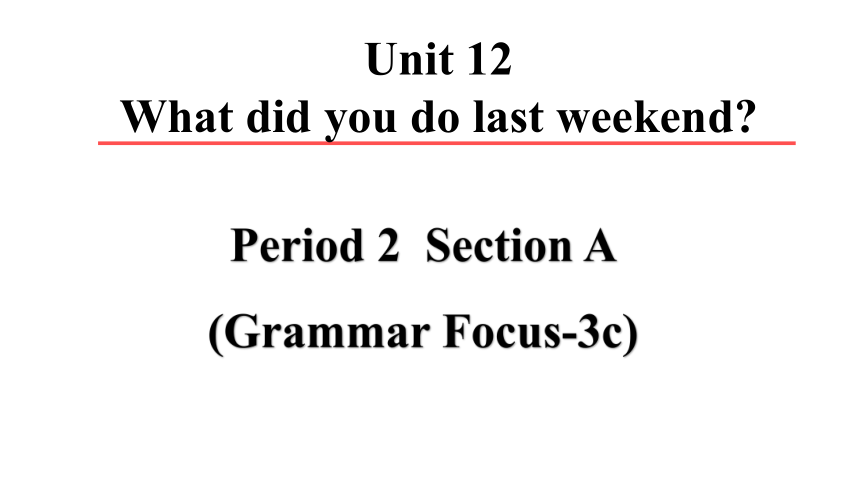 | |
| 格式 | pptx | ||
| 文件大小 | 12.0MB | ||
| 资源类型 | 教案 | ||
| 版本资源 | 人教新目标(Go for it)版 | ||
| 科目 | 英语 | ||
| 更新时间 | 2023-12-16 00:40:29 | ||
图片预览

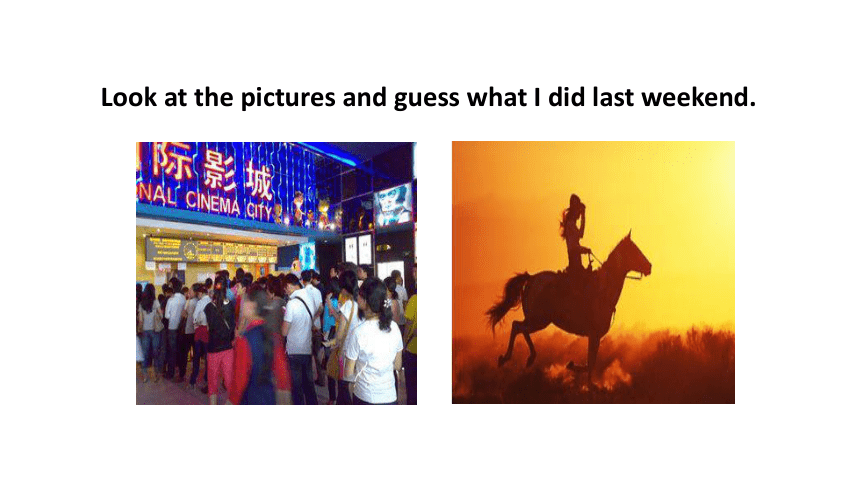
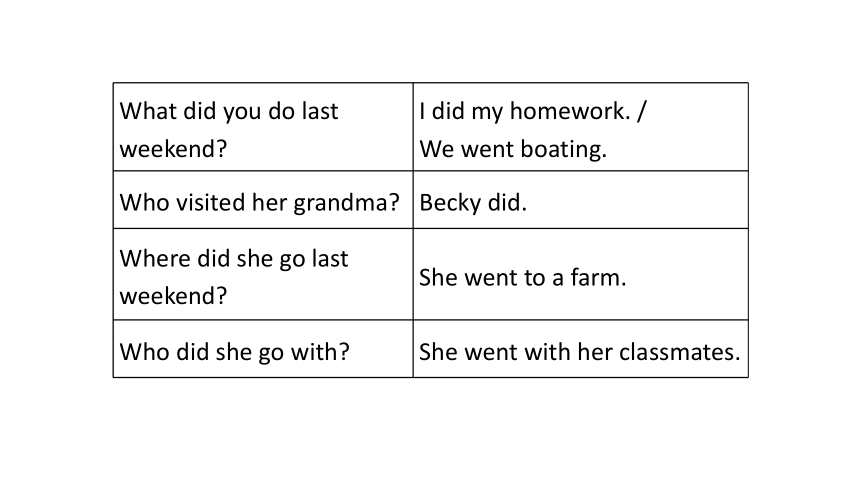
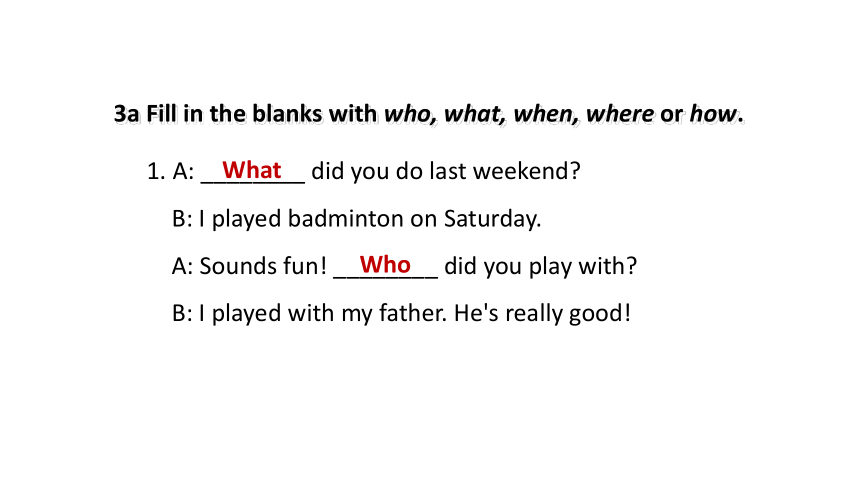

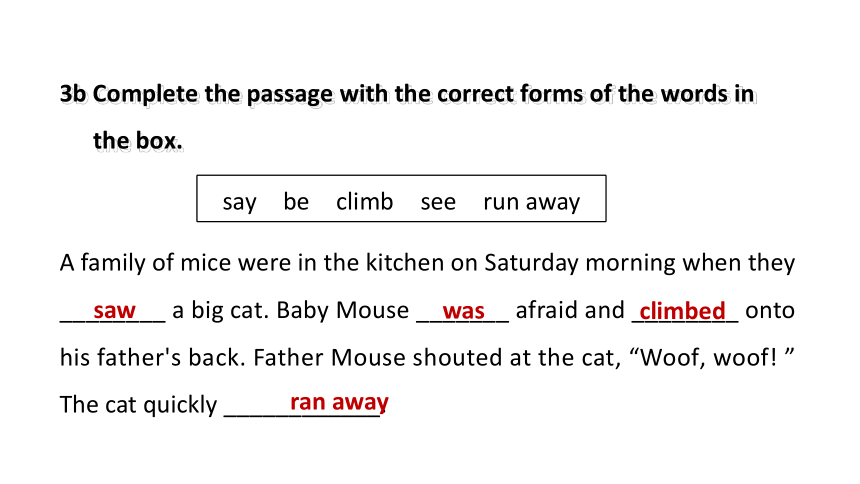
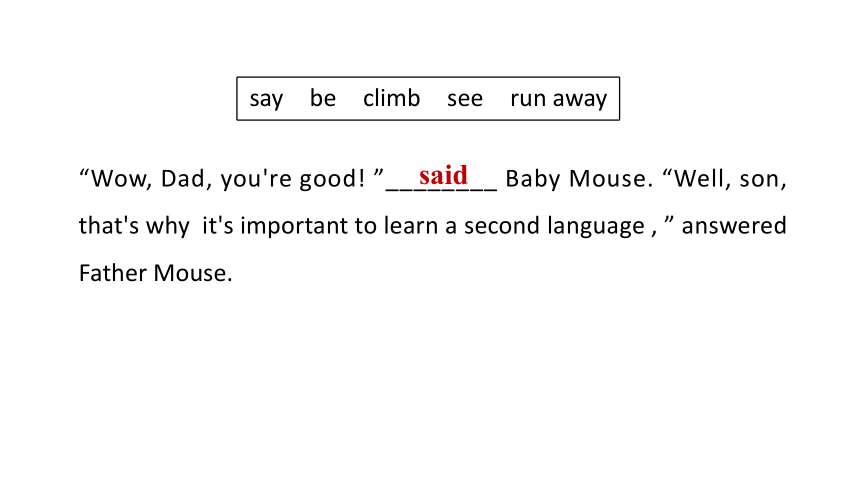

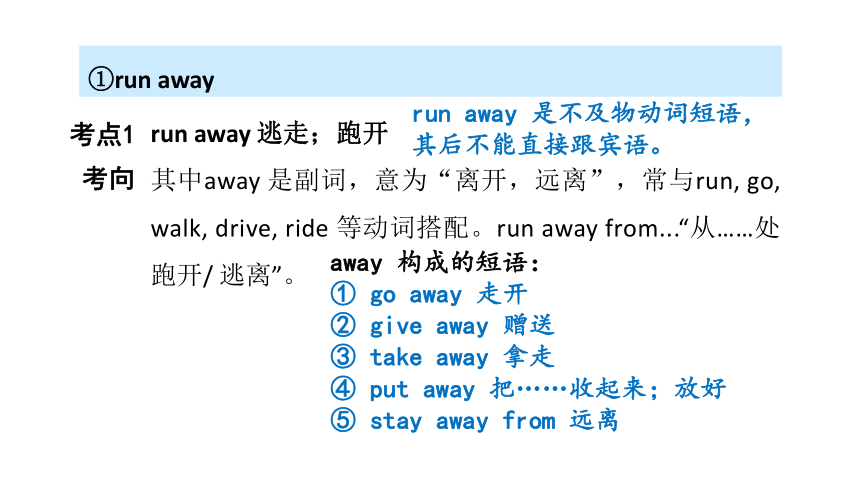
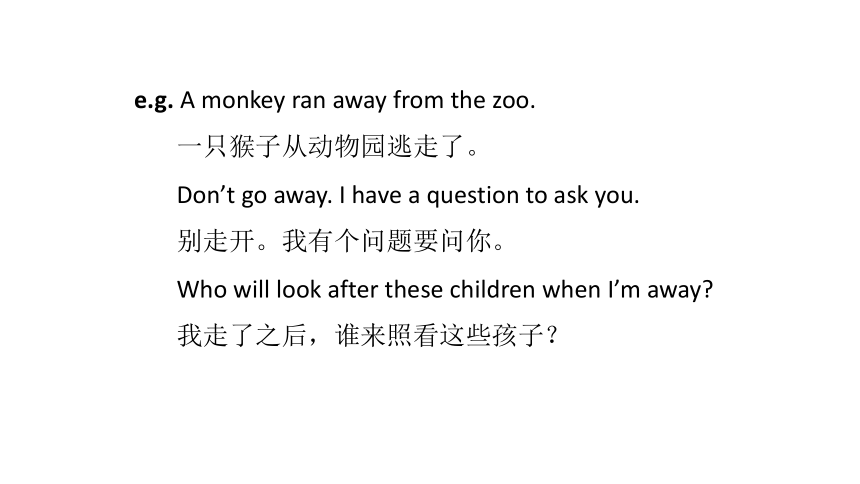
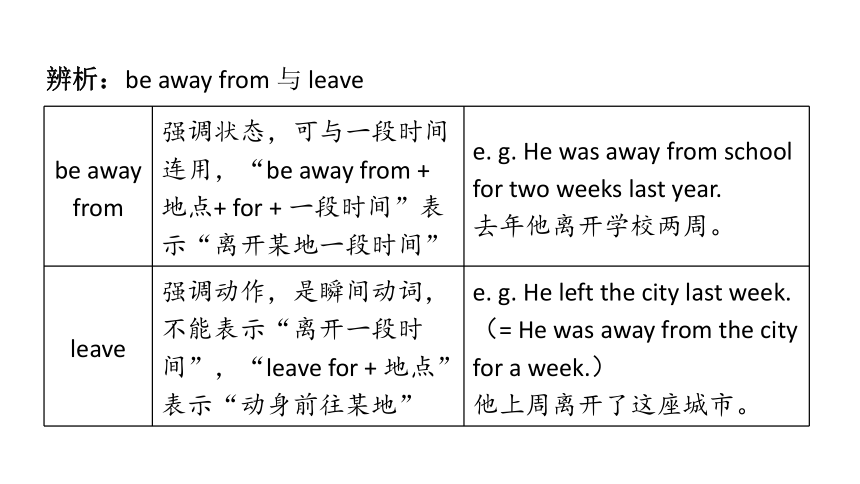
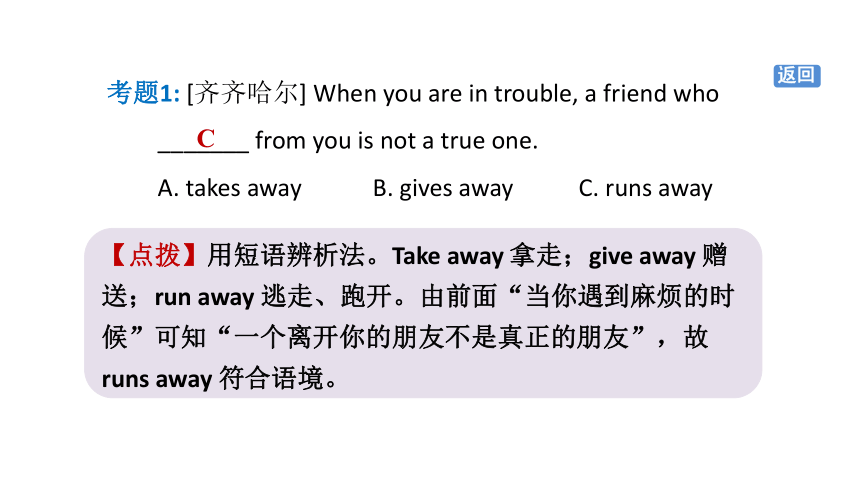
文档简介
(共34张PPT)
Period 2 Section A
(Grammar Focus-3c)
Unit 12
What did you do last weekend
Look at the pictures and guess what I did last weekend.
What did you do last weekend I did my homework. /
We went boating.
Who visited her grandma Becky did.
Where did she go last weekend She went to a farm.
Who did she go with She went with her classmates.
1. A: ________ did you do last weekend
B: I played badminton on Saturday.
A: Sounds fun! ________ did you play with
B: I played with my father. He's really good!
3a Fill in the blanks with who, what, when, where or how.
What
Who
2. A: ________ was your weekend
B: It was great! I had so much fun!
A: ________ did you go
B: The weather was beautiful, so I went to the beach with my parents.
3. A: ________ did Jim lose
B: He lost his keys. He often loses things.
A: That's too bad. ________ did he lose them
B: I heard it was yesterday.
How
What
Where
When
3b Complete the passage with the correct forms of the words in the box.
say be climb see run away
A family of mice were in the kitchen on Saturday morning when they ________ a big cat. Baby Mouse _______ afraid and ________ onto his father's back. Father Mouse shouted at the cat, “Woof, woof! ” The cat quickly ____________.
saw
was
climbed
ran away
“Wow, Dad, you're good! ”________ Baby Mouse. “Well, son, that's why it's important to learn a second language , ” answered Father Mouse.
said
say be climb see run away
3c Think of two things you did last weekend. Draw pictures of them. Your classmates guess what you did.
①run away
run away 逃走;跑开
其中away 是副词,意为“离开,远离”,常与run, go, walk, drive, ride 等动词搭配。run away from...“从……处跑开/ 逃离”。
考点1
run away 是不及物动词短语,其后不能直接跟宾语。
考向
away 构成的短语:
① go away 走开
② give away 赠送
③ take away 拿走
④ put away 把……收起来;放好
⑤ stay away from 远离
e.g. A monkey ran away from the zoo.
一只猴子从动物园逃走了。
Don’t go away. I have a question to ask you.
别走开。我有个问题要问你。
Who will look after these children when I’m away
我走了之后,谁来照看这些孩子?
辨析:be away from 与 leave
be away from 强调状态,可与一段时间连用,“be away from +地点+ for + 一段时间”表示“离开某地一段时间” e. g. He was away from school for two weeks last year.
去年他离开学校两周。
leave 强调动作,是瞬间动词, 不能表示“离开一段时间”,“leave for + 地点”表示“动身前往某地” e. g. He left the city last week.(= He was away from the city for a week.)
他上周离开了这座城市。
考题1: [齐齐哈尔] When you are in trouble, a friend who _______ from you is not a true one.
A. takes away B. gives away C. runs away
C
【点拨】用短语辨析法。Take away 拿走;give away 赠送;run away 逃走、跑开。由前面“当你遇到麻烦的时候”可知“一个离开你的朋友不是真正的朋友”,故runs away 符合语境。
返回
②Father Mouse shouted at the cat, “Woof, woof! ”
shout/ a t/ v. 呼叫; 喊叫
e. g. There is no need to shout. 没必要喊叫。
考点2
辨析: shout at 与shout to
shout at 冲……大声叫嚷;吼(非善意,多指因生气或愤怒而冲某人大声吼叫)
shout to 对……大声喊叫(无恶意,多因距离远,目的是让别人听见)
e. g. The mother was angry, but she didn’t shout at her child.
妈妈很生气,但是她没有冲着孩子大喊大叫。
He had to shout to the boy far away.
他不得不对着远处的男孩大喊。
拓展:shout 还可作名词,表示“呼喊;喊叫声”。
e.g. I heard a distant shout. 我听到了远处的一声喊叫。
考题2: He was so angry that he shouted _______ everyone.
A. at B. in C. for D. with
返回
A
③. . . , that’s why it’s important to learn a second language. . .
That’s why... 这就是……的原因
e.g. That’s why you should try your best to study.
这就是你应尽最大努力学习的原因。
拓展:That’s because... 意为“这是因为……”,because 后接的是原因。
e.g. That’s because he didn’t understand me.
这是因为他没有理解我。
考点3
why引导表语从句,后跟的是结果。
考题3: I got up late and that’s ________ I didn’t catch the train.
A. how B. why
C. when D. what
B
返回
a second language 第二语言
a second 意为“又一;再一”。
e.g. Last year they opened a second supermarket.
去年他们又开了一家超市。
考点4
当序数词与a/an 连用时,并不表示顺序,而是强调“再一……”。
考向
一般过去时的特殊疑问句
特殊 疑问词 常用的特殊疑问词有what, who, whose, which, when, where, why, how 等;还有what 与其他名词构成的短语,如what color, what size 等,以及how 与其他形容词构成的短语,如how many, how old, how much, how far, how long 等。
构成 特殊疑问词作主语或特殊疑问词加名词作主语时,疑问句的构成为:特殊疑问词(+ 名词)+ 谓语动词的过去式+ 其他 ①
特殊疑问词作其他成分时,特殊疑问句的构成为:
① 特殊疑问词+ was/were + 主语+ 形容词+ 其他?(含be 动词)
② 特殊疑问词+ did + 主语+ 动词原形+ 其他?(含实义动词)
③ 特殊疑问词+ 情态动词过去式+ 主语+ 动词原形+ 其他?(含情态动词)②
1 e.g. Who went camping yesterday
昨天谁去露营了?
Whose bike was broken just now
刚才谁的自行车坏了?
返回
2 e.g. Why was your mother worried yesterday
昨天你妈妈为什么担心?
What did he listen to last night
昨天晚上他听什么了?
Where could they go 他们能去哪里呢
特别提醒: 在否定句和疑问句中,如果出现did/didn’t,后面的谓语动词应用原形。
考题1: [无锡] —______ did the online concert begin
—You didn’t miss anything. It has just begun.
A. When B. Where
C. What D. Why
A
考题2: [重庆A 卷] The students planted trees in the park last week.(对画线部分提问)
_________ ________ the students plant trees last week
【点拨】句意:学生们上周在公园里种树。画线部分是地点状语,疑问词用where;根据“planted”可知变疑问句时借助助动词did。
Where did
返回
一般过去时 一般现在时
含义① 表示过去某个时间发生的动作或存在的状态。 表示现阶段经常发生的动作或存在的状态; 表示习惯、能力等; 表示永恒的真理。
时间 标志词 yesterday, last weekend / night /Saturday, the day before yesterday, yesterday morning / afternoon / evening, two days ago, in 2010 等 today, often, usually, sometimes, always, every
day, every weekend, on Sundays 等
一般过去时和一般现在时的区别
一般过去时 一般现在时
陈述句② 肯定句: ①主语+ 动词过去式+ 其他. ②主语+ was / were + 其他. 否定句: ①主语+ didn’t + 动词原形+其他. ②主语+ wasn’t / weren’t + 其他. 肯定句:
①主语+ 动词原形/ 动词第三人称单数+ 其他.
②主语+ am/is/are + 其他.
否定句:
①主语+ don’t/doesn’t + 动词原形+其他.
②主语+ am not/isn’t/aren’t + 其他.
一般过去时 一般现在时
一般 疑问句③ ① Did + 主语+ 动词原形+ 其他? ② Was/Were + 主语+ 其他? ① Do/Does + 主语+ 动词原形+ 其他?
② Am/Is/Are + 主语+ 其他?
特殊 疑问句④ ① 特殊疑问词+ was/were + 主语+ 其他 ② 特殊疑问词+ did + 主语+ 动词原形+ 其他 ① 特殊疑问词+ am/is/are + 主语+ 其他
② 特殊疑问词+ do/does + 主语+ 动词原形+其他
1 e.g. I usually ride a bike to school, but yesterday I took a bus.
我常骑自行车去上学,但是昨天我乘坐了公共汽车。
返回
2 e.g. She was very happy then, but now she feels sad.
那时她很高兴,但是现在她感觉难过。
Jack doesn’t like sports, and he didn’t have a P.E. class yesterday.
杰克不喜欢运动,昨天他没上体育课。
返回
3 e.g. Did they go to the beach 5 days ago
5 天前他们去海滩了吗?
Does the boy like playing chess
那个男孩喜欢下国际象棋吗?
返回
4 e.g. What did you do just now
刚才你做什么了?
What do you often do on weekends
周末你经常做什么?
考题3: [北京] The Shenzhou-15 astronauts _______ to Earth safely on June 4,2023.
A. return B. returned
C. will return D. have returned
【点拨】句意:神舟十五号宇航员于2023 年6 月4 日安全返回地球。根据“on June 4, 2023”可知是过去发生的事情,用一般过去时,谓语动词用过去式returned。
B
考题4: [长春] There ______ some beautiful flowers on the teacher’s desk now.
A. is B. was C. are D. were
【点拨】考查时态及主谓一致。句意:现在老师的桌子上有一些漂亮的花。主语“some beautiful flowers”是可数名词复数,be 动词用复数,结合“now”可知用一般现在时,be 动词用are。
C
返回
本节课主要听写了单词, 继续学习了一般过去时这一语法内容, 掌握了知识点run away, mouse, shout, That’s why…, a second的用法, 并做了相应的练习加以巩固。
Period 2 Section A
(Grammar Focus-3c)
Unit 12
What did you do last weekend
Look at the pictures and guess what I did last weekend.
What did you do last weekend I did my homework. /
We went boating.
Who visited her grandma Becky did.
Where did she go last weekend She went to a farm.
Who did she go with She went with her classmates.
1. A: ________ did you do last weekend
B: I played badminton on Saturday.
A: Sounds fun! ________ did you play with
B: I played with my father. He's really good!
3a Fill in the blanks with who, what, when, where or how.
What
Who
2. A: ________ was your weekend
B: It was great! I had so much fun!
A: ________ did you go
B: The weather was beautiful, so I went to the beach with my parents.
3. A: ________ did Jim lose
B: He lost his keys. He often loses things.
A: That's too bad. ________ did he lose them
B: I heard it was yesterday.
How
What
Where
When
3b Complete the passage with the correct forms of the words in the box.
say be climb see run away
A family of mice were in the kitchen on Saturday morning when they ________ a big cat. Baby Mouse _______ afraid and ________ onto his father's back. Father Mouse shouted at the cat, “Woof, woof! ” The cat quickly ____________.
saw
was
climbed
ran away
“Wow, Dad, you're good! ”________ Baby Mouse. “Well, son, that's why it's important to learn a second language , ” answered Father Mouse.
said
say be climb see run away
3c Think of two things you did last weekend. Draw pictures of them. Your classmates guess what you did.
①run away
run away 逃走;跑开
其中away 是副词,意为“离开,远离”,常与run, go, walk, drive, ride 等动词搭配。run away from...“从……处跑开/ 逃离”。
考点1
run away 是不及物动词短语,其后不能直接跟宾语。
考向
away 构成的短语:
① go away 走开
② give away 赠送
③ take away 拿走
④ put away 把……收起来;放好
⑤ stay away from 远离
e.g. A monkey ran away from the zoo.
一只猴子从动物园逃走了。
Don’t go away. I have a question to ask you.
别走开。我有个问题要问你。
Who will look after these children when I’m away
我走了之后,谁来照看这些孩子?
辨析:be away from 与 leave
be away from 强调状态,可与一段时间连用,“be away from +地点+ for + 一段时间”表示“离开某地一段时间” e. g. He was away from school for two weeks last year.
去年他离开学校两周。
leave 强调动作,是瞬间动词, 不能表示“离开一段时间”,“leave for + 地点”表示“动身前往某地” e. g. He left the city last week.(= He was away from the city for a week.)
他上周离开了这座城市。
考题1: [齐齐哈尔] When you are in trouble, a friend who _______ from you is not a true one.
A. takes away B. gives away C. runs away
C
【点拨】用短语辨析法。Take away 拿走;give away 赠送;run away 逃走、跑开。由前面“当你遇到麻烦的时候”可知“一个离开你的朋友不是真正的朋友”,故runs away 符合语境。
返回
②Father Mouse shouted at the cat, “Woof, woof! ”
shout/ a t/ v. 呼叫; 喊叫
e. g. There is no need to shout. 没必要喊叫。
考点2
辨析: shout at 与shout to
shout at 冲……大声叫嚷;吼(非善意,多指因生气或愤怒而冲某人大声吼叫)
shout to 对……大声喊叫(无恶意,多因距离远,目的是让别人听见)
e. g. The mother was angry, but she didn’t shout at her child.
妈妈很生气,但是她没有冲着孩子大喊大叫。
He had to shout to the boy far away.
他不得不对着远处的男孩大喊。
拓展:shout 还可作名词,表示“呼喊;喊叫声”。
e.g. I heard a distant shout. 我听到了远处的一声喊叫。
考题2: He was so angry that he shouted _______ everyone.
A. at B. in C. for D. with
返回
A
③. . . , that’s why it’s important to learn a second language. . .
That’s why... 这就是……的原因
e.g. That’s why you should try your best to study.
这就是你应尽最大努力学习的原因。
拓展:That’s because... 意为“这是因为……”,because 后接的是原因。
e.g. That’s because he didn’t understand me.
这是因为他没有理解我。
考点3
why引导表语从句,后跟的是结果。
考题3: I got up late and that’s ________ I didn’t catch the train.
A. how B. why
C. when D. what
B
返回
a second language 第二语言
a second 意为“又一;再一”。
e.g. Last year they opened a second supermarket.
去年他们又开了一家超市。
考点4
当序数词与a/an 连用时,并不表示顺序,而是强调“再一……”。
考向
一般过去时的特殊疑问句
特殊 疑问词 常用的特殊疑问词有what, who, whose, which, when, where, why, how 等;还有what 与其他名词构成的短语,如what color, what size 等,以及how 与其他形容词构成的短语,如how many, how old, how much, how far, how long 等。
构成 特殊疑问词作主语或特殊疑问词加名词作主语时,疑问句的构成为:特殊疑问词(+ 名词)+ 谓语动词的过去式+ 其他 ①
特殊疑问词作其他成分时,特殊疑问句的构成为:
① 特殊疑问词+ was/were + 主语+ 形容词+ 其他?(含be 动词)
② 特殊疑问词+ did + 主语+ 动词原形+ 其他?(含实义动词)
③ 特殊疑问词+ 情态动词过去式+ 主语+ 动词原形+ 其他?(含情态动词)②
1 e.g. Who went camping yesterday
昨天谁去露营了?
Whose bike was broken just now
刚才谁的自行车坏了?
返回
2 e.g. Why was your mother worried yesterday
昨天你妈妈为什么担心?
What did he listen to last night
昨天晚上他听什么了?
Where could they go 他们能去哪里呢
特别提醒: 在否定句和疑问句中,如果出现did/didn’t,后面的谓语动词应用原形。
考题1: [无锡] —______ did the online concert begin
—You didn’t miss anything. It has just begun.
A. When B. Where
C. What D. Why
A
考题2: [重庆A 卷] The students planted trees in the park last week.(对画线部分提问)
_________ ________ the students plant trees last week
【点拨】句意:学生们上周在公园里种树。画线部分是地点状语,疑问词用where;根据“planted”可知变疑问句时借助助动词did。
Where did
返回
一般过去时 一般现在时
含义① 表示过去某个时间发生的动作或存在的状态。 表示现阶段经常发生的动作或存在的状态; 表示习惯、能力等; 表示永恒的真理。
时间 标志词 yesterday, last weekend / night /Saturday, the day before yesterday, yesterday morning / afternoon / evening, two days ago, in 2010 等 today, often, usually, sometimes, always, every
day, every weekend, on Sundays 等
一般过去时和一般现在时的区别
一般过去时 一般现在时
陈述句② 肯定句: ①主语+ 动词过去式+ 其他. ②主语+ was / were + 其他. 否定句: ①主语+ didn’t + 动词原形+其他. ②主语+ wasn’t / weren’t + 其他. 肯定句:
①主语+ 动词原形/ 动词第三人称单数+ 其他.
②主语+ am/is/are + 其他.
否定句:
①主语+ don’t/doesn’t + 动词原形+其他.
②主语+ am not/isn’t/aren’t + 其他.
一般过去时 一般现在时
一般 疑问句③ ① Did + 主语+ 动词原形+ 其他? ② Was/Were + 主语+ 其他? ① Do/Does + 主语+ 动词原形+ 其他?
② Am/Is/Are + 主语+ 其他?
特殊 疑问句④ ① 特殊疑问词+ was/were + 主语+ 其他 ② 特殊疑问词+ did + 主语+ 动词原形+ 其他 ① 特殊疑问词+ am/is/are + 主语+ 其他
② 特殊疑问词+ do/does + 主语+ 动词原形+其他
1 e.g. I usually ride a bike to school, but yesterday I took a bus.
我常骑自行车去上学,但是昨天我乘坐了公共汽车。
返回
2 e.g. She was very happy then, but now she feels sad.
那时她很高兴,但是现在她感觉难过。
Jack doesn’t like sports, and he didn’t have a P.E. class yesterday.
杰克不喜欢运动,昨天他没上体育课。
返回
3 e.g. Did they go to the beach 5 days ago
5 天前他们去海滩了吗?
Does the boy like playing chess
那个男孩喜欢下国际象棋吗?
返回
4 e.g. What did you do just now
刚才你做什么了?
What do you often do on weekends
周末你经常做什么?
考题3: [北京] The Shenzhou-15 astronauts _______ to Earth safely on June 4,2023.
A. return B. returned
C. will return D. have returned
【点拨】句意:神舟十五号宇航员于2023 年6 月4 日安全返回地球。根据“on June 4, 2023”可知是过去发生的事情,用一般过去时,谓语动词用过去式returned。
B
考题4: [长春] There ______ some beautiful flowers on the teacher’s desk now.
A. is B. was C. are D. were
【点拨】考查时态及主谓一致。句意:现在老师的桌子上有一些漂亮的花。主语“some beautiful flowers”是可数名词复数,be 动词用复数,结合“now”可知用一般现在时,be 动词用are。
C
返回
本节课主要听写了单词, 继续学习了一般过去时这一语法内容, 掌握了知识点run away, mouse, shout, That’s why…, a second的用法, 并做了相应的练习加以巩固。
同课章节目录
- Unit 1 Can you play the guitar?
- Section A
- Section B
- Unit 2 What time do you go to school?
- Section A
- Section B
- Unit 3 How do you get to school?
- Section A
- Section B
- Unit 4 Don't eat in class.
- Section A
- Section B
- Unit 5 Why do you like pandas?
- Section A
- Section B
- Unit 6 I'm watching TV.
- Section A
- Section B
- Review of Units 1-6
- Unit 7 It's raining!
- Section A
- Section B
- Unit 8 Is there a post office near here?
- Section A
- Section B
- Unit 9 What does he look like?
- Section A
- Section B
- Unit 10 I'd like some noodles.
- Section A
- Section B
- Unit 11 How was your school trip?
- Section A
- Section B
- Unit 12 What did you do last weekend?
- Section A
- Section B
